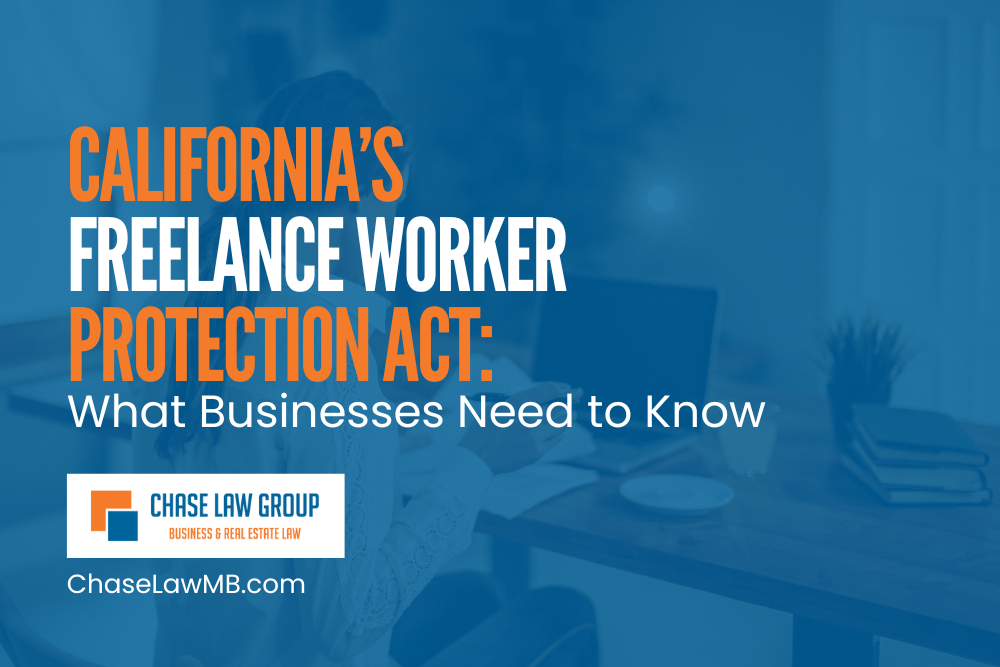California’s Freelance Worker Protection Act: What Businesses Need to Know
By Admin December 02, 2024 Category: Contracts Tags: business attorney Business Compliance California business california labor laws chase law manhattan beach contractor protections deann chase employment law freelance legal guidance Freelance Worker Protection Act freelancer rights FWPA independent contractors los angeles business attorney small business law

California is once again leading the way in labor protections, this time with the Freelance Worker Protection Act (FWPA), which takes effect on January 1, 2025. If your business hires freelance workers, it’s time to prepare for significant changes in how you engage with independent contractors. Here’s what you need to know about the FWPA and how to ensure compliance.
The Basics of the FWPA
The FWPA establishes baseline protections for freelance workers and applies to contracts worth $250 or more. These protections include requirements for written contracts, timely payment, and anti-retaliation measures. Inspired by a similar ordinance enacted in Los Angeles last year, the FWPA aims to give freelance workers the rights they deserve while providing clarity for hiring parties.
Key Definitions:
Freelance Worker: A single individual operating as a bona fide independent contractor providing professional services (e.g., marketing, design, photography, writing, and more).
Hiring Party: Any person or organization within California engaging a freelance worker, excluding governments and individuals hiring for personal benefit.
What the FWPA Requires
Written Agreements:
Hiring parties must provide a written contract to freelance workers before starting any work. This contract must outline:
- Each party’s name and address.
- A description of the services to be provided.
- The compensation amount and payment method.
- Payment deadlines or the mechanism for determining due dates.
- Contracts must be retained for at least four years. Even without a written agreement, actions and communications can be used as evidence of a contract’s existence.
Timely Payment:
Freelance workers must be paid:
- By the date specified in the contract, or
- Within 30 days of completing services if no date is specified.
Protections for Freelancers
The FWPA also includes safeguards against discrimination and retaliation. Hiring parties may not penalize freelancers for:
- Reporting violations.
- Participating in FWPA enforcement proceedings.
- Asserting their rights under the law.
Additionally, once a project begins, hiring parties cannot demand changes to compensation or scope as a condition of timely payment.
Enforcement and Penalties
Freelancers can sue to enforce their rights and may recover damages, attorney’s fees, and other remedies. For example:
- If a hiring party refuses to provide a written contract upon request, the freelancer can receive $1,000 in damages.
- For unpaid compensation, freelancers can recover up to double the amount owed.
How to Prepare Your Business for the FWPA
- Identify Freelancers: Assess which contractors and vendors qualify as freelancers under the FWPA.
- Audit Your Contracts: Update agreements to include all mandatory terms to meet FWPA requirements.
- Review Policies: Add protections for freelancers in your anti-discrimination and retaliation policies.
- Train Your Team: Educate those hiring or managing freelancers about FWPA requirements.
- Prioritize Payments: Ensure processes are in place to meet payment by contract deadlines or within 30 days.
- Retain Records: Implement a system to store written contracts for at least four years.
Why This Matters
Noncompliance could result in costly penalties and legal challenges. Businesses working with freelancers should act now to align policies and practices with FWPA standards. If you have questions, consulting with a qualified legal expert is advisable.
The FWPA underscores California’s commitment to safeguarding freelancers while offering businesses a structured approach to engagement. Consulting with a legal advisor experienced in employment law is highly recommended to ensure your business navigates these changes smoothly. If you have additional questions or need guidance, set up a consultation with Chase Law Group or call 310.545.7700 to assess your organization’s readiness for the FWPA.
Prepare for the FWPA changes—reach out for legal guidance!
WWW.CHASELAWMB.COM
Contact Chase Law Group
Please note that this article is for informational purposes only and should not be considered legal advice and does constitute an attorney-client relationship. It is recommended to consult with an attorney and your insurance carrier directly for specific guidance pertaining to your business and its practices.

